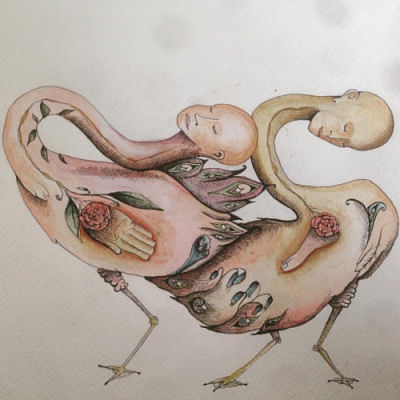It’s on us to end rape culture

The truth is, we, as a society, have failed: we haven't found a solution to the pervasive rape culture in Bangladesh—over 630 women have been raped in the last 6 months (Ain O Salish Kendra)—because we haven't been addressing the problem in the first place. Rather, we have been aggravating it in many ways, perhaps inadvertently.
Recently, I asked Nina Goswami, a senior deputy director at Ain o Salish Kendra, "Why is sexual violence on the rise?" She responded that as lawyers see, "the culture of impunity"—as evidenced by the appallingly low conviction rates for sex offenders—inflates self-confidence of perpetrators and leads them to commit more crimes. It goes without saying that the country's legal system and sexual harassment laws need reforms. But a legal prohibition is not enough to stop vile acts altogether, especially when it comes to rape and sexual harassment, crimes that are built into the misogynistic structure of society. Put another way, rape is a cultural issue: it emerges from somewhere within our communities, and it means that individuals in society—even those who aren't perpetrators—legitimise sexual assault with established cultural norms and attitudes that give more voice to myths such as victim-blaming than the actual account of the survivors. So, it's impossible to deny that there is something wrong, not just in the legal system, but also in our regressive societal mindsets that sustain the vicious cycle of sexual violence. "But there hasn't been any substantial sociological research on why rape happens, although that would be very relevant to counter the culture," says Nina Goswami.
So, let's try a social experiment: imagine a scenario where someone gave you a duty to fight sexual violence in your community. What would you do to counter the rape culture? The rules of your assigned duty preclude joining a crime-fighting squad or a human rights group. It's rather to self-reflect on your daily actions, conversations, and thoughts that potentially contribute to the rape culture. Now, internalise that sense of social responsibility, as you read my interview with eminent psychologist, professor Mehtab Khanam on the shocking frequency of rape crimes against children, and the specific norms that perpetuate rape culture. Only with introspection can we truly reverse this epidemic.
How would you explain the rise in rape crimes?
Mehtab Khanam: There's a combination of factors that can explain it. Generally, it comes from the trivialisation of sexual violence in the community. And that itself is emboldened by the systemic failure of the two most important pillars of society: education and the legal system. Regarding education, in my view, the recruiting system for teachers is faulty since a candidate's merit and values aren't evaluated in the hiring process although it is the most necessary element. Students have to be treated with care, and individual teachers who are hired should be trained to do that. In many ways, the system today has been losing the very essence of education. Punitive practices remain widespread nationwide. What we're witnessing with sexual violence in some madrasas today shows that teacher-student relationships are becoming more toxic by the day.
Why are men increasingly violating women? What does it say about our social attitudes towards women?
One of the main reasons for that escalation is the expansion of the Internet. In Bangladesh, most people today have access to technology and child pornography. Although it is criminalised, there isn't a rigorous system of monitoring that can prevent access to harmful content. And with the lack of education on consent and respect for women, young boys are susceptible to the misguided sexual entitlement that pornographic material imparts. In my experience, many young boys don't understand what respect for women actually means, and they aren't taught at home or in school. Currently, crude disrespect is the society's default attitude towards women. When videos of high-profile crimes are posted on social media, I observe the comments and always find a number of people who are keen on finding reasons, any reason, to blame or shame a woman. Regarding Nayan Bond, the main accused in the Barguna murder case, I noticed many people were pointing accusing fingers at Rifat's wife who helplessly tried to save her husband. Many were shaming her. Even when I come across interviews, I see how people comment on a female journalist's clothing, mannerisms, etc. There is a normalised social thrust to view women negatively in every situation, and it's not just men who do that. Women also do it. And this lens through which the society sees women is a major source of the problem.
It seems that sexually abusing children is becoming more common. Is it because they are easier to exploit (as in 7-year-old Saima's case)?
It's paedophilia: a sexual desire for children. Children are easier to intimidate and their silence is easier to acquire, but this is also a legitimate psychological disorder. In one of the cases I've dealt with, a father chronically abused his daughter until she reached puberty, and then it became very clear to me that his issue was paedophilia. In most of the cases involving paedophilia that I've dealt with, the abusers, especially the fathers, never came in for treatment. Most of them don't understand there's anything wrong with them. Usually, I deal with such victims and the trauma they've lived through as a result of being sexually abused by their elderly family members.
On a broader level, how do family dynamics contribute to rape culture?
A big source of sexual violence is normalised violence. Parenting with force and violence remains common in many sections of society. The practice of parents physically abusing children has been socially validated as a method of exercising authority to enforce discipline. This shapes a child's psychology, and so they begin to replicate it: they express anger and feed their worst impulses. They grow up believing that violence is rational, and so when they violate someone, they believe it is justified. Especially for boys, they take it out on women, who they feel are more vulnerable than them. In many cases, when a person has been subjected to sexual abuse in their childhood, they might feel a desire to violate children and inflict the pain they've felt in their past on someone who is less powerful than them. When someone is victimised by the abuse of power in their own family, they can feel a desire to victimise someone else. Bullying begins at home and the bullied becomes the bully outside.
Crimes are being reported but there have been no solutions. Is there anything wrong with our current lexicon on rape?
In my opinion, the way the media has been reporting on rape—circulating images of victims especially—works like a trigger for rapists, especially paedophiles. It's becoming what we call a "copycat" situation. Rape incidents are narrated in a raw manner with salacious details, and highlighting injustice in a dramatic, elevated way discourages survivors from coming forward. And mostly, reports don't bring up any images of the male rapists and murderers. But it's important to remind people that these men are humans who live among us, who may appear normal. Reporting on rape has international guidelines because these situations are very sensitive. I think female journalists are better-suited for covering rape incidents as they might understand or relate to the situations better. But in general, when it comes to reporting on rape from a preventive perspective, it's important for every journalist to be cautious and empathetic.
Ramisa Rob is a master's candidate in New York University.

 For all latest news, follow The Daily Star's Google News channel.
For all latest news, follow The Daily Star's Google News channel. 



Comments